|
|
|
Sort Order |
|
|
|
Items / Page
|
|
|
|
|
|
|
| Srl | Item |
| 1 |
ID:
110899
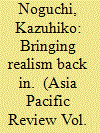

|
|
|
|
|
| Publication |
2011.
|
| Summary/Abstract |
This article argues that offensive realism is applicable to explain China's strategic behavior. Contrary to constructivist and liberal arguments, ideational and domestic factors are not the primary causes of China's strategic behavior. Instead, structural and material factors such as anarchy and the distribution of relative power significantly shape how China behaves in the Asia-Pacific. Furthermore, they have a larger impact relative to non-material/unit-level variables on China's policymaking. Available evidence strongly indicates that China's strategic behavior is driven by power maximizing calculation. China's grand strategy, its maritime ambition as well as naval modernization, and rapid growth rate of military expenditure all confirm the hypotheses of offensive realism.
|
|
|
|
|
|
|
|
|
|
|
|
|
|
|
|
| 2 |
ID:
110898
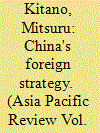

|
|
|
|
|
| Publication |
2011.
|
| Summary/Abstract |
This article introduces four trends of China's foreign strategy. Analysis of China's diplomacy since the 1980s based on these concepts demonstrates China's intent to become a great power and its aspirations for a China-centric order.
|
|
|
|
|
|
|
|
|
|
|
|
|
|
|
|
| 3 |
ID:
110897


|
|
|
| 4 |
ID:
110901
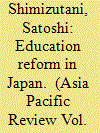

|
|
|
|
|
| Publication |
2011.
|
| Summary/Abstract |
Japan's current education system has its origins in postwar reform, overemphasizing individualism and underemphasizing on Japan's history, traditions, and culture, resulting in the continuing decline in scholastic, physical, and socializing ability to date. This essay reviews the IIPS proposal on educational reform, which was supervised by former Prime Minister Yasuhiro Nakasone, with the addition of the author's personal views. The IIPS proposal set the ultimate goal of education in Japan to be raising healthy people who have self-confidence and pride as Japanese who can thrive in the era of globalization. Then, the proposal presents what a Japanese should learn and how he should serve at each life stage beginning with early childhood education through the compulsory education period, adolescence and young adulthood, maturity, and into the elderly period. Moreover, the organizational reform on administrating education policy is presented, with a focus on abandoning the current board of education system.
|
|
|
|
|
|
|
|
|
|
|
|
|
|
|
|
| 5 |
ID:
110902
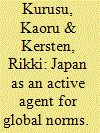

|
|
|
|
|
| Publication |
2011.
|
| Summary/Abstract |
Japan has shaped a distinct human security policy based on evolving policy preferences of successive domestic political leaders and the gradual assimilation of external norms into its own foreign policy. Independent experts have played a particularly significant role in advising Japanese policy elites on how human security could be used by Japan to become an "intellectual leader" within the United Nations and other relevant institutions. This article explores those processes that occurred in the early phase of norm acceptance on the part of key Japanese policy actors and change agents in Japan from the late 1990s through 2003. It argues that human security has served as an effective approach for Japan to establish itself as a more independent foreign policy actor in contemporary international politics.
|
|
|
|
|
|
|
|
|
|
|
|
|
|
|
|
| 6 |
ID:
110896
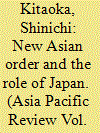

|
|
|
|
|
| Publication |
2011.
|
| Summary/Abstract |
China is changing the international order in East Asia. It is not only a matter of a power transition, but also a matter of a change in the international system. Chinese people tend to see the world order in hierarchical terms as they did for centuries; nationalism is used as a tool of national integration; and government control of the military is weakening. These are the factors behind the rise of China. If these trends continue, a hierarchical order with China as hegemon might be established in East Asia. It seems as if we are returning to the period before the nineteenth century when China led the world. However, the international order in the twenty-first century has to be based upon such principles as the rule of law, peaceful solution of conflict, democracy, and human rights. In order to establish such an order, Japan and other countries that have committed to those values should unite firmly. China also would benefit very much from that order in the long run.
|
|
|
|
|
|
|
|
|
|
|
|
|
|
|
|
| 7 |
ID:
110900


|
|
|
|
|
| Publication |
2011.
|
| Summary/Abstract |
Over the past 20 years, Japanese politics has changed significantly. There have been many improvements over the old LDP politics. At the same time, however, the rules of the game, which were predicated on the dominance of a single political party and on factional politics, have inevitably changed, and, in accordance with this situation, the conventions that prescribed the party-political order have fallen by the wayside. Given this situation, new conventions are now required that will make Japanese politics function. This article will discuss the most pressing topics: they are the appointment of the prime minister, the political cycle, bicameralism and party politics, intra-party governance, and the relationship between ministers and bureaucrats. These rules will not derive from new laws or institutions, but will be based on new conventions agreed to by the political parties. Political parties are to be the key actors in creating the new conventions, which should provide the rules of the game for Japanese politics.
|
|
|
|
|
|
|
|
|
|
|
|
|
|
|
|
|
|
|
|
|